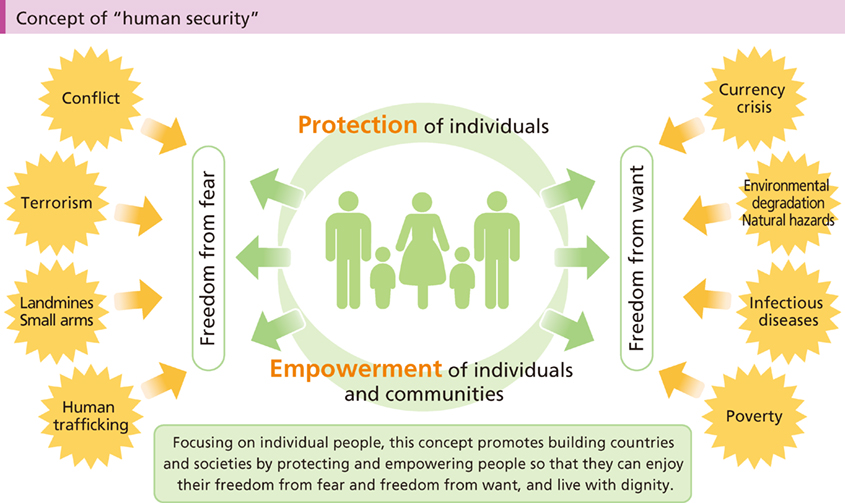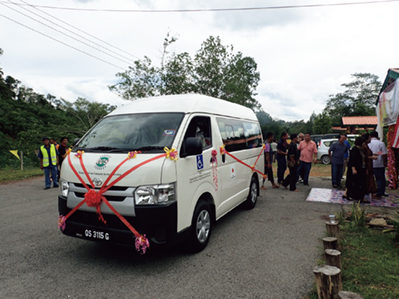(4) Disparity Reduction (Assistance for People who Tend to be in Vulnerable Situations)
Ongoing efforts are being made to implement initiatives towards the achievement of the SDGs. Meanwhile, a number of issues such as difficulty in identifying where problems lie and addressing them properly from the broader national level are gradually being brought to light. “Increase of disparities” is one of them. Moreover, challenges such as poverty, conflicts, infectious diseases, terrorism, and natural disasters have varying impact depending on the situations that individuals are in, including their country and region, or whether they are women and/or children. To deal with this situation, it is effective to adopt an approach that takes the standpoint of individual people, which is essential for the realization of a society that fulfills the SDGs principle of “no one will be left behind.”
<Japan's Efforts>
•Human Security
Under such circumstances, Japan places priority on the principle of “human security.” This concept focuses on each individual, and seeks to build states and communities by protecting and empowering individuals so that they can live in dignity, free from fear and want.
To advance human security, the Government of Japan undertakes various efforts, both to (i) promote the concept and to (ii) put it into practice.
(i)To promote the concept, Japan has played a leading role in establishing the “Commission on Human Security,” which is an international commission of experts, and its successor the Advisory Board on Human Security, as well as convening the informal, open-ended forum Friends of Human Security. Furthermore, Japan led the adoption of two UN resolutions and made efforts to work out the definition of the concept. The UN General Assembly unanimously adopted a resolution concerning a common understanding on human security in 2012 under Japan's leadership.
(ii) For putting the concept into practice, Japan spearheaded the launch of the “UN Trust Fund” for Human Security in 1999. Japan has thus far contributed approximately ¥45.3 billion in total, and supported 238 projects in 90 countries and regions to ensuring human security, implemented by UN agencies (all figures as of the end of December 2016). In the Development Cooperation Charter (approved by the Cabinet in 2015), human security is defined as the guiding principle that lies at the foundation of Japan's development cooperation.

•Assistance for Persons with Disabilities
It is important that capacity building and community development are promoted to ensure the social participation and inclusion of people in vulnerable situations in society, such as young people and women, and especially persons with disabilities.
It is Japan's policy to pay due attention to the socially vulnerable, including persons with disabilities, when planning and implementing ODA policies for development cooperation. Policies for persons with disabilities cover a number of different fields, including welfare, health and medical care, education, and employment. Japan has applied the techniques and experiences it has accumulated in these fields through ODA and NGO activities for persons with disabilities in developing countries. For example, Japan carefully tailors its assistance to suit various local needs, such as promoting barrier-free design in the construction of railroad infrastructure and airports, building vocational training centers and rehabilitation facilities for persons with disabilities, and providing minibuses for their transportation.

A vehicle supplied by Japan for use in transporting users of a facility for the disabled in a rural part of the island of Borneo
Additionally, through JICA, Japan provides a range of technical cooperation to enhance the capacity of organizations and personnel offering assistance to persons with disabilities in developing countries. Included among these efforts are the acceptance of trainees from developing countries and the dispatch of JOCVs and experts from various sectors, including physical and occupational therapists and social workers.
In 2014, Japan ratified the Convention on the Rights of Persons with Disabilities. The Convention established independent clauses setting out that states parties would undertake measures for international cooperation and its promotion (Article 32). Japan continues to contribute to improving the rights of persons with disabilities in developing countries through ODA and other means.
